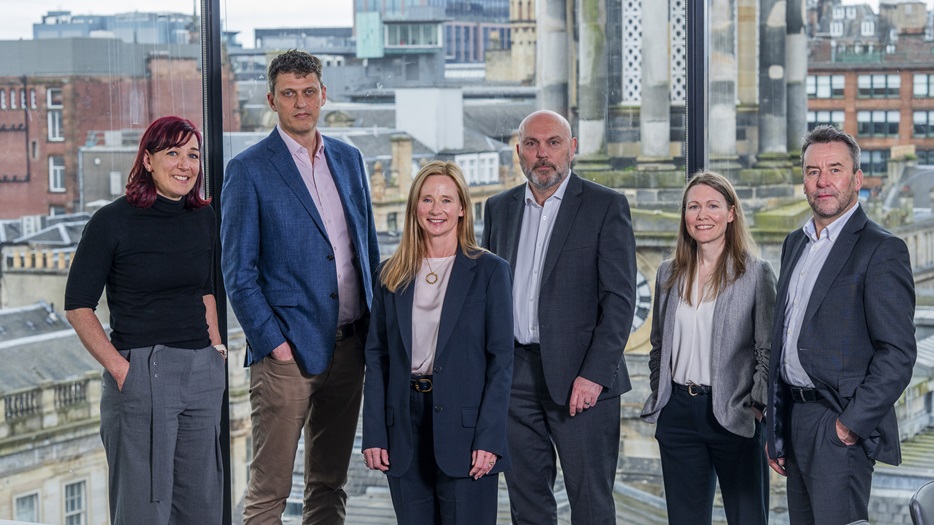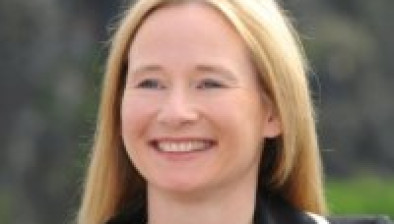Transport leaders call for cross-sector collaboration on Clyde Metro

(from left) Mary Hewitt, consulting partner leading on transport transformation projects at Deloitte; Rob Scopes, infrastructure and capital projects lead partner at Deloitte; Angela Mitchell, senior partner for Scotland at Deloitte; Ross Martin, adviser on regional economies; Jenni MacKenzie, senior transport consultant; and Mark Wild, CEO at SGN (Picture: Chris Watt Photography)
Leading transport industry figures have called for cross-sector collaboration and a customer-centric approach to the Clyde Metro programme.
Clyde Metro, a multimodal, mass transit public transport system, initially emerged as a key recommendation from Transport Scotland’s national Strategic Transport Projects Review 2. It is one of eighteen developments identified as being of national importance under the statutory National Planning Framework 4 (NPF4).
It also forms a key part of various regional and local strategies, including Strathclyde Partnership for Transport’s statutory Regional Transport Strategy and Glasgow City Council’s Transport Strategy.
An event hosted by Deloitte yesterday saw local government, policymakers, developers, investors and senior leaders of large organisations gather for panel and breakout discussions, sharing industry insights and fostering a sense of ownership on the principles of confident delivery in relation to the programme.
Attendees heard from a panel of speakers made up of:
- Mark Wild: CEO at gas network operator SGN and former CEO of Crossrail
- Rob Scopes: infrastructure and capital projects lead partner at Deloitte
- Mary Hewitt: consulting partner leading on transport transformation projects at Deloitte
- Jenni MacKenzie: senior transport consultant and previously senior programme manager and fleet manager for major events including the Olympics and the Commonwealth Games
- Ross Martin: adviser on regional economies and a member of the Connectivity Commission, which birthed the concept of Clyde Metro
Mark Wild, CEO at SGN, said: “The Clyde Metro programme is an exciting and ambitious endeavour that will transform the transport experience and drive economic growth in the region. Throughout my time leading Crossrail to the opening of the Elizabeth Line, I learned valuable lessons that can be of value for the Clyde Metro programme. One of the most important lessons is the need for Clyde Metro to define and maintain focus on the envisaged end state and outcomes at every stage of the development process. While it’s important to balance the needs and demands of the programme delivery interim phases, it is essential not to lose sight of the desired outcomes.
“Inevitably in today’s increasingly hyper-complex world, external crises and challenges will arise during the long lifespans of these sorts of major programmes. To best manage these uncertainties, Clyde Metro will need resilient buy-in from across political, business, societal, and governmental arenas. By building strong relationships and partnerships, Clyde Metro can effectively manage these inevitable challenges and ensure the success of the programme.”
Jenni MacKenzie, senior transport consultant, said: “The Clyde Metro programme is more than just a transport project – it will have a significant impact on education, employment, and economic growth in the region. To ensure its success, Clyde Metro must engage across the stakeholder landscape, both at a sectoral level, but also beyond. Bringing all the stakeholders together and aligned around a set of common objectives will result in the successful execution of the design, delivery, and execution of this integrated multi-modal transport ecosystem. By doing so, Clyde Metro can ultimately improve the end customer experience.
“However, with the introduction of a multi-modal delivery system, there are new risks to consider, such as increased complexity within the supply chain and managing change. Therefore, Clyde Metro should develop strategies and plans to mitigate these risks and ensure the success of the programme.”
Rob Scopes, infrastructure and capital projects lead partner at Deloitte, added: “The Clyde Metro programme is of national and regional significance, with far reaching ambition to transform the economy of the region. We work with a wide variety of clients tackling some of the most challenging projects in order to deliver societal benefits including better places to live and work. It is essential that all stakeholders ’set up for success’ at all stages of a project’s lifecycle – taking a holistic view of the whole eco-system including client bodies, advisors, supply chain partners and so forth. Done well, this can unlock value and accelerate delivery.”

















